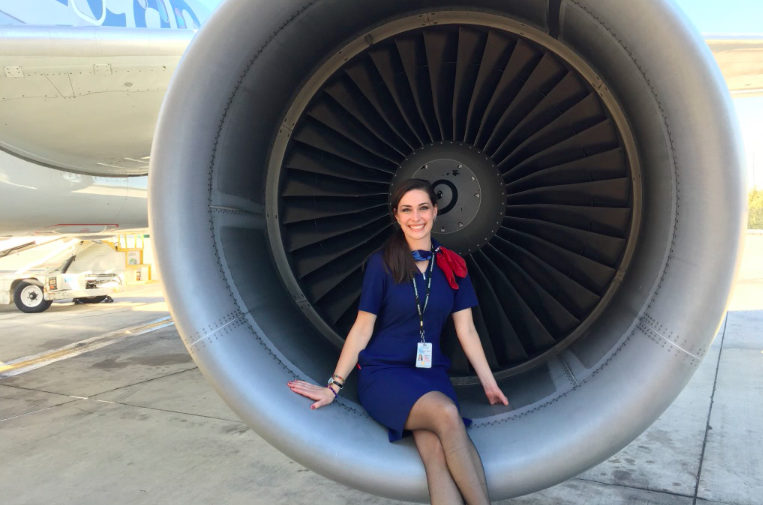
At first glance Philadelphia-based flight attendant, Sarah Tuberty looks just like any other member of crew working for American Airlines (aside from the fact that she’s actually wearing the regulation uniform – although that’s a whole other issue). But take a closer look and you’ll notice that the fingers on Sarah’s right hand end just before the knuckle.
Not that a mere limb difference as Sarah describes it is going to stop her doing her dream job.
Sarah was born with a rare congenital limb deformity known as Symbrachydactyly (pronounced: sim-BRA-chi-DAK-til-ee). The condition is present in around 1 out of every 32,000 births and typically only affects one hand.
No one knows for sure what causes the condition, although experts think it might be caused by an interruption of the blood supply to the developing arm at four to six weeks of pregnancy.
Treatment options can vary but Sarah’s parents opted to try a procedure known as a free phalangeal transfer when she was still very little. The surgery involves removing a bone from the toe and transferring it to the finger in order to increase the overall length of the finger and allow for a better grip.
In Sarah’s case, only one finger took to the transferred bone but it still increased how much she could use her hand and allowed her to try different activities like baton, basketball, horseback riding, and ballet. Only recently, Sarah has even started aerial arts without a problem.
And if Sarah can hang from a rope high above the ceiling, then her difference isn’t going to stop her carrying out emergency procedures onboard a plane or simply serving a drink at 35,000 feet.
“I can do this,” Sarah say’s of her job as a flight attendant. “I passed the same training (as every other flight attendant),” she continues.
But if you are one of Sarah’s passengers, should you be worried she might spill a drink on you? “Don’t worry, I gotcha,” she says reassuringly. “I’ve never spilt a drink on anyone and I won’t spill it on you.” Now that’s an achievement that very few flight attendants can say they own.
Unfortunately, people do judge by appearance. “Some of the hardest parts (of having a limbing difference) are navigating the reactions,” Sarah comments.
But she ends with a message of hope, urging people to accept differences. “This is human variation. This is what a hand can look like. Sometimes people have fingers, sometimes people don’t.”
Sarah’s story was originally featured in an American Airlines video that forms part of a series called American Stories:
Mateusz Maszczynski honed his skills as an international flight attendant at the most prominent airline in the Middle East and has been flying ever since... most recently for a well known European airline. Matt is passionate about the aviation industry and has become an expert in passenger experience and human-centric stories. Always keeping an ear close to the ground, Matt's industry insights, analysis and news coverage is frequently relied upon by some of the biggest names in journalism.







